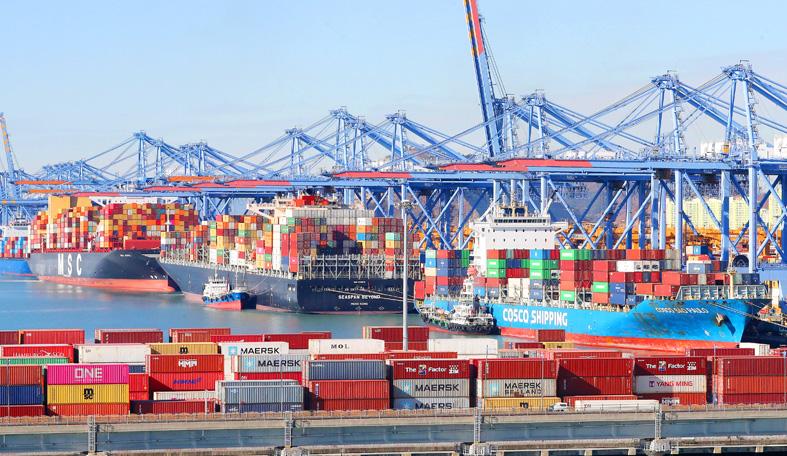South Korea’s exports to China dropped last month, highlighting the impact that COVID-19-related lockdowns in Chinese cities are having on supply chains around the region.
Shipments to China fell 3.4 percent from a year earlier, compared with a 16.6 percent gain in March, the South Korean Ministry of Trade, Industry and Energy said in a statement yesterday.
Overall exports advanced 12.6 percent last month, while semiconductor sales increased 15.8 percent.

Photo: EPA-EFE
South Korea is a barometer of worldwide demand, with its manufacturing capability ranging from chips to displays and refined oil. The diversity of destinations for its overseas shipments also means its trade performance is something of a heat map for global economic activity.
Demand has been softening in Europe and China since Russia’s invasion of Ukraine, as more Chinese cities go into lockdown under the country’s “zero COVID” policy. These twin risks to the global economy have further inflamed inflationary pressures and triggered renewed disruptions in supply chains.
Still, a strong recovery in the US has helped maintain momentum for South Korean exports. Demand for technology products such as displays and semiconductors also remains resilient, allowing major exporters like Samsung Electronics Co to report a surge in earnings.
South Korea’s heavy reliance on trade means it needs exports to hold up to prevent the economy from slowing further, and provide scope for the Bank of Korea to stick to its path of policy normalization.
The central bank is scheduled to meet this month and is battling to rein in unexpectedly strong inflation. It has been among the early movers in raising interest rates.
Sunday’s data also showed average daily shipments increased 15 percent last month from a year earlier.
Total automobile exports advanced 6.1 percent last month, while shipments of wireless communications devices rose 8.3 percent.
Overall exports to the US gained 26.4 percent, while those to Japan increased 6.2 percent and to the EU they were up 7.4 percent.
Exports to the Commonwealth of Independent States fell 46.5 percent.

MULTIFACETED: A task force has analyzed possible scenarios and created responses to assist domestic industries in dealing with US tariffs, the economics minister said The Executive Yuan is tomorrow to announce countermeasures to US President Donald Trump’s planned reciprocal tariffs, although the details of the plan would not be made public until Monday next week, Minister of Economic Affairs J.W. Kuo (郭智輝) said yesterday. The Cabinet established an economic and trade task force in November last year to deal with US trade and tariff related issues, Kuo told reporters outside the legislature in Taipei. The task force has been analyzing and evaluating all kinds of scenarios to identify suitable responses and determine how best to assist domestic industries in managing the effects of Trump’s tariffs, he

TIGHT-LIPPED: UMC said it had no merger plans at the moment, after Nikkei Asia reported that the firm and GlobalFoundries were considering restarting merger talks United Microelectronics Corp (UMC, 聯電), the world’s No. 4 contract chipmaker, yesterday launched a new US$5 billion 12-inch chip factory in Singapore as part of its latest effort to diversify its manufacturing footprint amid growing geopolitical risks. The new factory, adjacent to UMC’s existing Singapore fab in the Pasir Res Wafer Fab Park, is scheduled to enter volume production next year, utilizing mature 22-nanometer and 28-nanometer process technologies, UMC said in a statement. The company plans to invest US$5 billion during the first phase of the new fab, which would have an installed capacity of 30,000 12-inch wafers per month, it said. The

Taiwan’s official purchasing managers’ index (PMI) last month rose 0.2 percentage points to 54.2, in a second consecutive month of expansion, thanks to front-loading demand intended to avoid potential US tariff hikes, the Chung-Hua Institution for Economic Research (CIER, 中華經濟研究院) said yesterday. While short-term demand appeared robust, uncertainties rose due to US President Donald Trump’s unpredictable trade policy, CIER president Lien Hsien-ming (連賢明) told a news conference in Taipei. Taiwan’s economy this year would be characterized by high-level fluctuations and the volatility would be wilder than most expect, Lien said Demand for electronics, particularly semiconductors, continues to benefit from US technology giants’ effort

‘SWASTICAR’: Tesla CEO Elon Musk’s close association with Donald Trump has prompted opponents to brand him a ‘Nazi’ and resulted in a dramatic drop in sales Demonstrators descended on Tesla Inc dealerships across the US, and in Europe and Canada on Saturday to protest company chief Elon Musk, who has amassed extraordinary power as a top adviser to US President Donald Trump. Waving signs with messages such as “Musk is stealing our money” and “Reclaim our country,” the protests largely took place peacefully following fiery episodes of vandalism on Tesla vehicles, dealerships and other facilities in recent weeks that US officials have denounced as terrorism. Hundreds rallied on Saturday outside the Tesla dealership in Manhattan. Some blasted Musk, the world’s richest man, while others demanded the shuttering of his